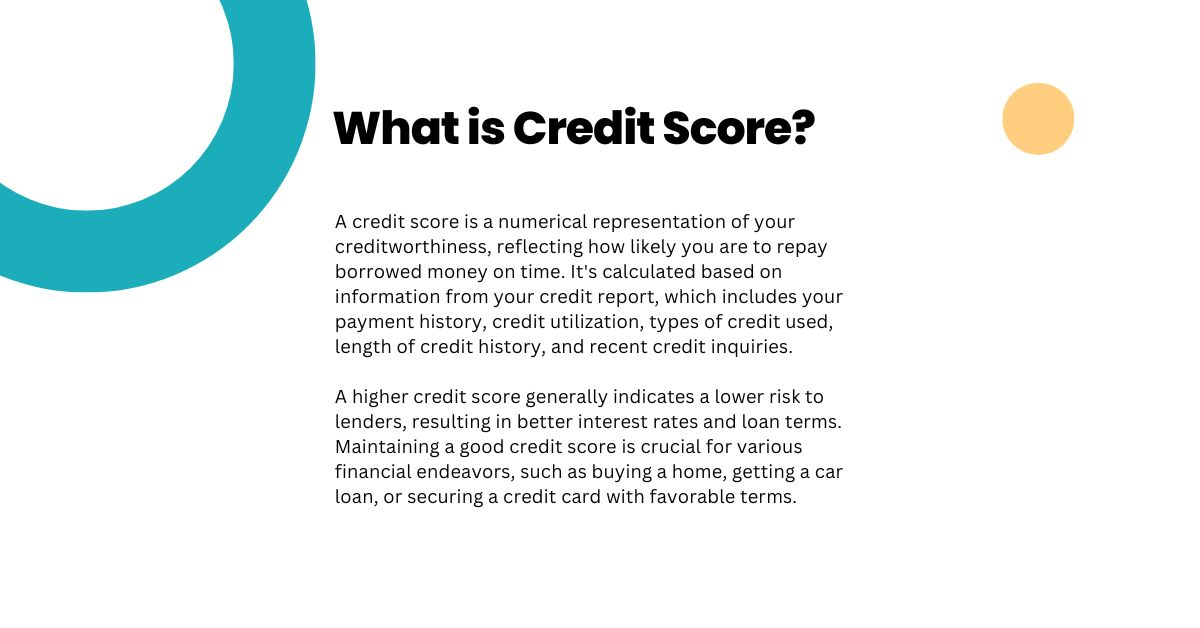Just like a student receives a report card at the end of a semester, your financial habits are graded too. Your credit score is essentially your financial report card, reflecting how responsibly you’ve managed credit over time. Lenders use this score to assess your creditworthiness, determining whether you’re a reliable borrower.
What is Credit Score?

A credit score is a numerical representation of your creditworthiness, reflecting how likely you are to repay borrowed money on time. It’s calculated based on information from your credit report, which includes your payment history, credit utilization, types of credit used, length of credit history, and recent credit inquiries.
A higher credit score generally indicates a lower risk to lenders, resulting in better interest rates and loan terms. Maintaining a good credit score is crucial for various financial endeavors, such as buying a home, getting a car loan, or securing a credit card with favorable terms.
How Does Credit Scoring System Work?
The credit scoring system is a complex algorithm that evaluates your creditworthiness based on various factors derived from your credit report. Key factors considered include:
- Payment History: This is the most significant factor, accounting for a substantial portion of your credit score. Timely payments on credit cards, loans, and other lines of credit demonstrate your reliability as a borrower.
- Credit Utilization Ratio: This measures the amount of credit you’ve used compared to your total available credit. A lower utilization ratio, typically below 30%, indicates responsible credit management.
- Credit History Length: A longer credit history generally signifies a more stable financial profile. It shows that you’ve been able to manage credit responsibly over time.
- Credit Mix: Having a diverse mix of credit accounts, such as credit cards, mortgages, and auto loans, can positively impact your credit score.
- Recent Credit Inquiries: Frequent applications for new credit can negatively affect your score, as it may signal financial instability.
Credit bureaus, such as Experian, Equifax, and TransUnion in the United States, collect and maintain your credit information. They use this data to calculate your credit score using proprietary formulas. Different credit scoring models, such as FICO and VantageScore, may produce slightly different scores, but they all rely on similar underlying principles.
How Your Credit Score Calculated?
Your credit score is calculated using a complex algorithm that considers several key factors:
- Payment History (35%): This is the most important element. Your dependability as a borrower is demonstrated by a history of timely payments on credit cards, loans, and other lines of credit. Your score can be considerably lowered by missing or making late payments.
- Amount Owed (30%): This factor assesses your credit utilization ratio, which is the amount of credit you’ve used compared to your total available credit. A lower utilization ratio, ideally below 30%, indicates responsible credit management.
- Length of Credit History (15%): In general, a more stable financial profile is indicated by a longer credit history. It demonstrates your ability to carefully handle credit over time.
- New Credit (10%): Frequent applications for new credit can negatively impact your score, as it may signal financial instability.
- Credit Mix (10%): Having a diverse mix of credit accounts, such as credit cards, mortgages, and auto loans, can positively impact your credit score.
It’s important to note that different credit scoring models, such as FICO and VantageScore, may weigh these factors slightly differently. However, the underlying principles remain the same. By understanding these factors and practicing responsible credit behavior, you can maintain a good credit score and improve your financial standing.
What Affects Your Credit Scores?
Several factors affect your credit score, including your payment history, credit utilization ratio, length of credit history, credit mix, and recent credit inquiries. Timely payments on credit cards and loans are crucial, as they demonstrate your reliability as a borrower. Keeping your credit utilization ratio low, ideally below 30%, indicates responsible credit management.
A longer credit history suggests a more stable financial profile. Having a diverse mix of credit accounts, such as credit cards, mortgages, and auto loans, can also positively impact your score. Finally, avoiding frequent applications for new credit can prevent unnecessary inquiries that may lower your score.
How Do I Improve My Credit Score?
It takes time and consistent effort to raise your credit score. Here are a few successful tactics:
- Pay Your Bills on Time: On-time payments are essential. To prevent missing deadlines, set up automatic payments.
- Keep Credit Utilization Low: Your credit usage percentage should not exceed 30%. This entails applying a smaller percentage of your credit limit.
- Limit New Credit Applications: Frequent applications for new credit can negatively impact your score.
- Maintain a Diverse Credit Mix: Having a mix of credit types, like credit cards and loans, can positively influence your score.
- Monitor Your Credit Report Regularly: Look for mistakes and inconsistencies in your credit report. Dispute any errors as soon as possible.
- Consider a Credit Counseling Service: If you’re struggling with debt, a credit counseling service can provide guidance and strategies to improve your credit score.
By following these tips and practicing responsible credit behavior, you can gradually improve your credit score over time.
Why Your Credit Score Changed?
Your credit score can change for a variety of reasons, even if you haven’t taken any specific actions. Here are some common causes:
Payment History Changes:
- Late Payments: Your score may suffer from with one late payment.
- Payment History Updates: As new payment information is reported to credit bureaus, your score may fluctuate.
Credit Utilization Changes:
- Increased Debt: If you’ve used more of your available credit, your credit utilization ratio increases, which can lower your score.
- Decreased Credit Limits: If your credit limits have been reduced, your utilization ratio may increase even if your debt hasn’t changed.
New Credit Accounts:
- Hard Inquiries: Applying for new credit can result in hard inquiries, which can temporarily lower your score.
- New Account Age: A new account can initially lower your average account age, which is a factor in your score.
Credit Report Errors:
- Incorrect Information: Errors on your credit report, such as incorrect payment history or inaccurate account information, can negatively impact your score.
Changes in Credit Scoring Models:
- Model Updates: Credit scoring models may be updated periodically, which can affect how your credit is evaluated.
Regularly checking your credit report and disputing any errors is crucial. By avoiding unnecessary credit applications, maintaining a low credit utilization, and making on-time payments, you can also raise your credit score.
Why Do I Have Different Credit Scores?
You might have different credit scores because of a few reasons:
- Different Credit Bureaus: There are three major credit bureaus in the U.S.: Experian, Equifax, and TransUnion. Each bureau collects and maintains credit information, and they may not always have the same information about you. This can lead to slight variations in your credit score.
- Different Credit Scoring Models: There are multiple credit scoring models, such as FICO and VantageScore. Each model uses different algorithms and weighs different factors, which can result in different scores. Lenders may use different models for different types of loans.
- Timing of the Score Calculation: Credit scores are calculated based on the information available at the time of the calculation. If you’ve recently made a payment or opened a new credit account, your score may change as new information is reported to the credit bureaus.
- Inaccuracies in Your Credit Report: Your score may be impacted by errors on your credit report. Regularly checking your credit report and disputing any errors is crucial.
While these factors can lead to variations in your credit score, it’s important to remember that the overall trend is more important than minor fluctuations. If you’re taking steps to improve your credit habits, such as paying bills on time and keeping your credit utilization low, your credit score should improve over time.
Why Are Credit Scores Important?
Credit scores are crucial for various financial aspects of your life. They serve as a numerical representation of your creditworthiness, indicating how likely you are to repay borrowed money on time. Your financial chances can be greatly impacted by having a high credit score:
Loan Approval and Interest Rates:
- Higher Approval Chances: A good credit score increases your chances of getting approved for loans, credit cards, and mortgages.
- Lower Interest Rates: Lenders often offer lower interest rates to borrowers with good credit scores, saving you money over time.
Rental Applications:
- Increased Chances of Approval: In order to evaluate the dependability of possible tenants, many landlords look at credit ratings. Your chances of being accepted for a rental property can be increased with a high score.
Employment Opportunities:
- Positive Perception: In some industries, a good credit score can be seen as a sign of financial responsibility, which may positively impact your job applications.
Insurance Premiums:
- Potential Discounts: Credit scores are taken into account by certain insurance firms when setting premiums. You can be eligible for reduced premiums if you have a high score.
Overall Financial Health:
- Financial Discipline: A good credit score reflects responsible financial habits and can contribute to overall financial well-being.
In essence, a good credit score is a valuable asset that can open doors to better financial opportunities and help you achieve your long-term financial goals.
If you want to read other financial blogs, you can read here:
- 10 Passive Income Ideas for Financial Freedom (2025)
- The G Factor in Stocks: How It Impacts Your Investments
What is a Good Credit Score?
A good credit score is generally considered to be 750 or higher. This indicates a strong credit history and responsible financial behavior. However, the specific range of a “good” credit score can vary slightly depending on the credit scoring model used.
A credit score between 670 and 739 is often considered “good,” while a score between 740 and 799 is considered “very good.” A score of 800 or higher is typically considered “excellent.”
What is Minimum Credit Score for a Loan?
The minimum credit score required for a loan varies depending on the type of loan, lender, and your specific financial situation. Generally, a credit score of 700 or above is considered good and can increase your chances of loan approval and better interest rates.
However, some lenders may be willing to consider applicants with lower scores, especially for secured loans where collateral is involved. It’s important to note that a lower credit score may result in higher interest rates and stricter loan terms.
Is a 900 Credit Score Possible?
A 900 credit score is extremely uncommon, even if it is technically achievable in some credit scoring schemes. A score of 900 might have been possible in older credit scoring models, but it’s not achievable with the current systems. Even a score of 850 is considered exceptional and requires a perfect credit history with consistent on-time payments, low credit utilization, and a diverse credit mix.

